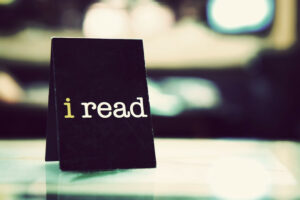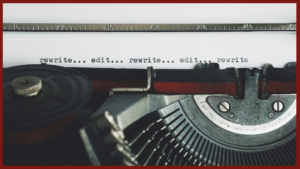Posts by Jillian Forsberg
You’ve done it! You’ve finished the manuscript that has overwhelmed your very being, haunted every hour of awakeness (and let’s be honest, also haunted your dreams). Now, for the next step:
Humans must read it.
Not Grammarly. Not ChatGPT. Not you.
Humans.
In the writing world, they’re often called beta readers. Finding beta readers can be like finding friends on your first day of high school. Remember being a freshman?
The round tables were full of unfamiliar faces, all closed in together, backs to you. Even if there was an empty chair, dare you sit? Dare you ask them to… READ YOUR MANUSCRIPT?!
Here’s the thing. You have to.
Humans must read your work. Finding those humans can be a challenge, yes, but here are the ways I’ve found beta readers.
First, there is someone in your life who reads. Maniacally. They’re the book-a-day library person who’s at every local book signing and posts cozy pictures of tea, cats, and novels. In the background of their photos, there are shelves and shelves. It doesn’t matter what genre they read, trust me. If you’re friendly with them, ask them to read your book.
Not only will this person devour your book quickly, but they’ll also likely give you valuable feedback based on the sheer volume of books they consume. They know the formulas, the character arcs, the plot devices, the tropes, the rules… and how to appropriately break them.
If they’re given the right set of questions, you can get a lot from a beta reader like this.
Second, there is someone who is an expert on a topic in your book. For me, it was a rhino keeper and two historians. I write animal historical fiction, so I absolutely had to be fact-checked.
Don’t have history elements? Maybe you write sci-fi? Find a local biology professor who has a little Ray Bradbury in them and ask them to read for you. Find a physicist. Find a total Star Wars nerd for your space opera. These people will be valuable to you because they’re well-versed in spotting tiny nuances you didn’t think of.
Again, you must ask them the right questions, and if you do, you’ll get more than you expect from them.
Lastly, the scariest one of all: find another writer. This beta reader will point out your weaknesses, your sentence structures, your too-perfect characters, and your crutches.
I recommend finding at least three beta readers. A reader, a knower, and a writer.
Now that you know who to look for, here’s how to ask them. Get their email address, or if you live close by, take them to coffee.
Please, copy/paste this. I know it can be scary. Use Writer Unboxed, friends, use it!
Subject: Would You Be My Beta Reader?
Hi [Name],
I’m so excited to connect with you! As you know, I’m a (GENRE) writer. I’ve just finished my manuscript, (TITLE), and it would do me a great honor if you’d consider being one of my beta readers.
Although the manuscript is done, I’m reaching out to a select few people to get some […]
Read MoreTherese here to trumpet that today’s WU author is now a published novelist! In fact, Jillian Forsberg’s debut, The Rhino Keeper, releases today! Congratulations, Jillian!
My debut novel, The Rhino Keeper, releases today through the micro-press History Through Fiction. They publish 2-3 titles a year.
I have a secret to tell you, reader.
I didn’t know how good I’d have it when I signed with this small press.
Many authors dream of big, six-figure deals with the biggest publishers in the world, or signing with the agent of your dreams. My fear, if I’d have signed with an agent, is that dreaded phrase: died on submission. This industry is full of highs and lows, and we all must face the reality that if you sign with an agent, you may not get a pub deal. The anguish!
But I’m here to tell you that if your goal is a book in your hands, you absolutely must consider small presses. Quite frankly, I don’t have the skill set to indie publish myself. Kudos to those who do. The ins and outs of the publishing industry and how to get a book into the world is not something I can do alone. It’s complicated, challenging, and difficult. Indie authors, you’re truly incredible humans who work every side of your career! I would still be floundering in the upload phase if I tried.
Now,I can’t speak to all the small presses, but I can tell you my experience with the one I’ve signed with.
Here’s why History Through Fiction is a gem:
— The submissions process was easy and my manuscript was requested within days of submitting.
—I heard back with an extremely kind offer email within weeks of the full request.
—The Zoom call offer was very low-pressure and things were spelled out clearly for me with what to expect, what resources and limitations exist within the small press, and what life is like for their authors.
—They gave me contact information for their authors so I could speak to them individually and find out what their experiences were like. Their authors were responsive, kind, and even chatted on the phone with me.
—The contract I had reviewed by a lawyer (my uncle, lucky me!) needed no changes and had a lovely royalty rate plus a small advance.
—I was given a multiple page marketing plan, plus the option to add ideas via a submittable website that allowed me to voice my own opinions.
—The edits for the manuscript were clear, collaborative, and easy to follow. Kindness exuded in the comments in the digital document.
—I had input and influence over the cover and interior of the book. Neither needed major changes after initial designs were sent over and I was wildly pleased with the results of both.
—Marketing was collaborative but I always felt I was getting an equal share of the platform with already-published works and my own, unpublished book.
—My ideas for marketing were met with excitement and the best word: “YES!”
—I was able to order many copies of the book in advance to sell on my own website and take to events, even pre-launch. This feels special as early readers are more likely to create a fan base.
—Giveaways, NetGalley, Goodreads, Amazon, LibraryThing – all of these things […]
Read MoreMy dad, Grant Overstake, has written millions of sentences. As a former journalist, pastor, and now novelist, he’s got what the writing world considers “chops.” Big papers like the Miami Herald published his sports column for years, and small papers had his by-line on every article from op-eds to sports to obits.
His young adult sports novels are precise, beautiful, engaging. His sermons, spoken word he wrote to help rural Kansans navigate their faith journeys and complicated lives in the late 90s, were captivating, heart-felt, well-rounded. This man has done it all in the writing world — if I listed his awards, I’d reach my word-limit in this article.
I decided early in my life that I, too, would be a writer. If you’re a parent and you try to get your kid to find passion in the things you love, you likely will feel one of two things: the sting of rejection accompanying an eye-roll, or the wave of pride accompanying an attempt. My first attempt was verbal storytelling, just like my dad behind the pulpit. It turned into written storytelling as soon as I could hold a pen. Sign me up, Dad! I wanted to be like him.
Sometimes, a sign-me-up attitude can be intimidating as a parent. What if your child is no good? What if they’re not coachable? What if criticism of them is too much? I don’t know what form of bravery swept me as a child, but I showed my award-winning journalist father my first attempt at a novel, written in a wide-ruled spiral-bound notebook.
“Don’t overwrite,” he said. “Simplify it. Here, read this.” And he handed me Hemingway, Herman Hesse, and Rick Reilly.
In high school, he read my articles for the school paper and with his bracing, left-handed scrawl, edited with no hesitation. I remember, at first, that it stung. I might’ve cried. I was fifteen, learning from a master. I worked harder, read more closely, listened carefully. I built my words on the true stories from a small-town high school where football reigned supreme. In this world, the girls on the sidelines weren’t writing articles; they were dressed in cheer uniforms, caught up in the spectacle rather than the storytelling.
I donned a cheer uniform, too, and learned and listened to how sports were played. I wrote for myself, for my classes, for my newspaper, for essay contests. I sought my dad’s praise, his admiration, his subtle nod that affirmed I’d done it right. I won some of my own awards.
I had to learn, from an amazing writer, how to accept what a first draft is: each sentence might change. Bones are there, meat needs to fill in around it. Simpler is better. Red ink is strengthening your work. None of this is personal – these words are not tattooed on you. Nothing is permanent until the paper’s put to bed, kid. I remember the smell of newsprint, the dusting of ink on the sides of his hands, his press badge on the kitchen counter, his fingers calloused with the grip of a pencil.
I learned how to accept his red ink […]
Read MorePlease welcome WU’s newest contributor–creative force and debut author, Jillian Forsberg!
Jillian holds a master’s degree in public history from Wichita State University and a bachelor’s degree in communication and history from McPherson College. Her historical research has been published in academic journals and she was the editor for Wichita State’s The Fairmount Folio.
Jillian’s research into little-known historical events led her to discover the story of Clara the Indian rhino, who dazzled Europe in the 18th century. Clara’s true story formed the basis for Jillian’s debut novel, The Rhino Keeper, which releases on October 22nd from History Through Fiction. And–fun fact–because The Rhino Keeper set pre-order records for her publisher, Jillian got to spend some quality time recently feeding rhinos!
“They must have been bonded. And so begins the harrowing, heart-wrenching tale of a man and his beloved rhinoceros, Clara. Inspired by real-life events, The Rhino Keeper by debut novelist Jillian Forsberg illuminates the extraordinary connection between humans and animals. Spanning two centuries, The Rhino Keeper is both a historical mystery and a tale of old-world adventure, reminding us that even the wishes we take to our grave may someday come true after all.” – Sarah Penner, NYT Bestselling Author of The Lost Apothecary and The London Séance Society
“Rich with adventure, historical detail, and love of all kinds, THE RHINO KEEPER is an enchanting true story. Jillian Forsberg brings Clara the rhinoceros and the humans who cared for her to vivid life, deftly interlacing the dual timelines to create a poignant tale that spans both continents and centuries. Just as the 18th century Europeans who flocked to meet Clara could not help but be changed by knowing her, readers of Forsberg’s accomplished debut will find their hearts expanded with each page they turn.” – Molly Greeley, author of MARVELOUS
Jillian’s passions lie firmly in the 18th century. When she isn’t tending to her bridal store, you will likely find her browsing the closest antique mall or reading every label at a museum. She’ll most likely be wearing vintage dresses–except when she’s feeding rhinos.
Learn more about Jillian and The Rhino Keeper on her website, and follow her on Instagram and X.
“Your antagonists are mustache-twirling Muppet-like characters,” said my editor. “We have to make them real people.”
Mustache-twirling? Muppet-like!? Good lord. Had I lost touch with writing bad guys?
“How do I do that?” I asked, my heart in my throat. I was prepared for the worst. Huge rewrite? Scrap everything!? Instead, I was assigned some surprises.
Relatable antagonists are some of the most difficult to write in fiction, particularly historical fiction, where in our mind’s eye, we see cloak-draped villains as an easy out. But my editor was right – as editors usually are – and my antagonists needed depth, substance, and work.
My assignment was to study well-done villains in movies and reflect upon myself. Myself? Luckily, movies came first.
The two movies on the docket: Gangs of New York and Footloose. I laughed at the suggestion. How could two very different movies, neither set in the right time period or place, help my book, set in […]
Read More











